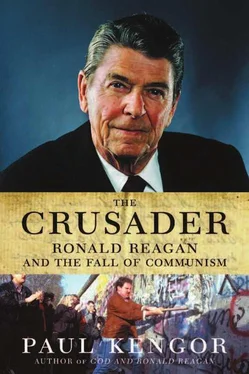For similar reasons, Reagan disliked containment, the doctrine conceptualized in 1947 by George F. Kennan. This strategy sought to contain the Soviet empire within its present reach, but the problem for Reagan was that containment did nothing to free those already captive peoples along the Soviet border. Rather than preserve containment, Reagan wanted to go beyond it, to reverse it, to liberate the Soviet bloc. “For as long as I knew him,” said Richard Allen, “Ronald Reagan rejected the doctrine of containment.” 9
Casper Weinberger, who had been with Reagan since 1967 and followed him to Washington as his secretary of defense, reiterated these sentiments, saying “The more he looked, the more he studied, the more he saw, the more he concluded that this [the USSR] was a regime that had to go. And this was certainly his own thinking well before the presidency, not some adviser’s.” Reagan came to this conclusion “quite early on. He did an awful lot of reading that people didn’t realize. He was very well educated on the whole thing.” 10Reagan, then, said Weinberger, determined that, “It wasn’t about containment; it was about winning the Cold War.” 11
Reagan, added Weinberger, insisted that Communism was incompatible with freedom and “was ultimately going to have to be destroyed and defeated.” 12He was unambiguous regarding Reagan’s intentions:
He recognized the folly inherent in the policy of “containment” of communism and the Soviet Union. He was not content to rest with the assumption that in eighty or ninety years, the USSR might collapse. He said from the beginning that communism and democratic capitalism were incompatible, that communism had to be challenged and defeated. 13
Weinberger stated categorically: “We were going to try to win the Cold War.” 14
Rejecting containment meant seeking victory, and the Soviets knew that this was what Reagan was striving toward. They grasped what Reagan meant when he rejected containment, and as early as 1975, they tried to head him off before he could pick up steam. In April 1975, in what may have been the first shot at Reagan in the Soviet press, commentator Yuri Zhukov complained in the pages of Pravda : “The resurrected political dinosaur from California proposes a… ‘policy of rolling back communism.’ It is incredible but true!” Equally amazing, said Zhukov, Reagan “promises the restoration of the old system in the countries of Eastern Europe.” 15Clearly, the Kremlin understood the stakes.
To Reagan, winning meant not only rejecting containment, but also rejecting détente, the policy of so-called “relaxed” U.S.–Soviet relations that the United States began under Nixon and continued through both the Ford and Carter administration. Sure, détente might “lessen tensions” between the superpowers by stimulating treaties and trade. However, in so doing, Reagan believed it condoned the enslavement of Eastern Europeans, not to mention Russians, Ukrainians, Estonians, Latvians, Lithuanians, Georgians, and millions more. Also, by helping the USSR, détente sustained the USSR, and prolonged rather than shortened its totalitarian existence and control.
By this rationale, accepting détente was akin to a schoolyard situation: There is a bully who terrorizes the smaller kids. Only one kid in class can lick the bully, but this would-be hero refuses to act simply so he and the brute can get along. And yet, even that is not a sufficient analogy. To be applicable to Reagan’s world, the bully would not just push around the weaker children and take their lunch money, he would beat them and not permit them to say grace (he hates religion, after all) before their meals. Moreover, the reluctant rescuer in this scenario could and should be a beacon, a shining light to others, challenged by the forces of history to dispatch the thug—who looked to expand his thuggery to other schoolyards—to the ash heap of the playground.
Détente allowed the bully to have his way.
To Reagan, rejecting Yalta, containment, and détente was step one on the road to recovery for Eastern Europe—of freedom from the Soviet grip. As Margaret Thatcher said, his rejection of containment and détente “proclaimed that the truce with Communism was over.” 16
Although these were the three main doctrines which Reagan rejected, there were other areas where he and the U.S. administrations differed, all of which were cut from the same cloth. For one, he rejected Nikita Khrushchev’s “peaceful coexistence,” because he spurned the idea of Soviet existence. He wanted peace but not coexistence. In Reagan’s judgment, coexistence did not engender “peace” for the enslaved inhabitants behind the Iron Curtain, who could be jailed for exercising the most basic civil rights. As long as coexistence remained, it meant that the USSR would continue its position as captor over the peoples beneath its control.
In addition, coexistence fed the notion of so-called “spheres of influence,” which maintained that both the United States and USSR had regions of influence or hegemony, in the West and East, and each side ought to respect the other’s sphere. To Reagan, “respecting” a Soviet sphere entailed, again, accepting the East’s subjugation. On the contrary, the U.S. sphere in Western Europe was free; the United States only governed one country: the United States.
This refusal to draw parallels between the two countries could also be seen in his rejection of moral equivalency, a doctrine dear to the heart of the political left, which claimed, among other things, that both the United States and USSR had legitimate mutual interests and thus an equally justifiable right to pursue their interests. To Reagan, the USSR pursuing its interests meant shackling people from Budapest to Bucharest. As far as Reagan was concerned, the people of Eastern Europe were still under siege, as they had been in World War II, only by a different hostile, totalitarian, occupying power. Western Europe won freedom in 1945, whereas Eastern Europe did not; its nightmare was still ongoing, and Reagan would not passively tolerate such repression for so many.
There was and could be no moral equivalency between America and a country that sought “world domination.” “It’s a frightening thought,” said Reagan in the spring of 1975, “but it should make Americans all the more determined to show Europe that we have no intention of leaving the pages of history with a whimper: that, with or without them, we’ll make our stand.” When sharing this thought in an interview, he quoted (from memory) Churchill, from when the prime minister readied to take on the Nazis, another moral unequal: “This is only the beginning of the reckoning. This is only the first sip, the first foretaste of the bitter cup which will be proffered to us year by year, unless by a supreme recovery of moral health and martial vigor we rise again and take our stand for freedom as in the olden times.” Churchill’s words, Reagan instructed, “are now our destiny.” 17
Ed Meese connected these different but intertwined concepts in Reagan’s eyes:
He was not satisfied with the détente idea, and moral equivalency, which was anathema to him, and implicit in détente. He saw détente as a one-way street [that benefited only Soviet interests]. He wanted to reverse that. He believed that throughout the seventies and said it repeatedly when he first ran in 1976. 18
These beliefs, particularly the real result of détente, came to determine much of Reagan’s stated policy during the buildup to his presidential campaigns. They came to represent the backbone of the stance that he would offer when president, much to the dismay of those inside the Kremlin. From Yalta to détente to “spheres of influence,” Reagan believed he had documented proof of failed attitudes toward the Soviet Union; at each juncture the United States was in denial about the true nature of Communism. Reagan was not willing to make the same mistake, and these ideas soon became the cornerstone of the principles that he hoped would govern America to greatness.
Читать дальше












